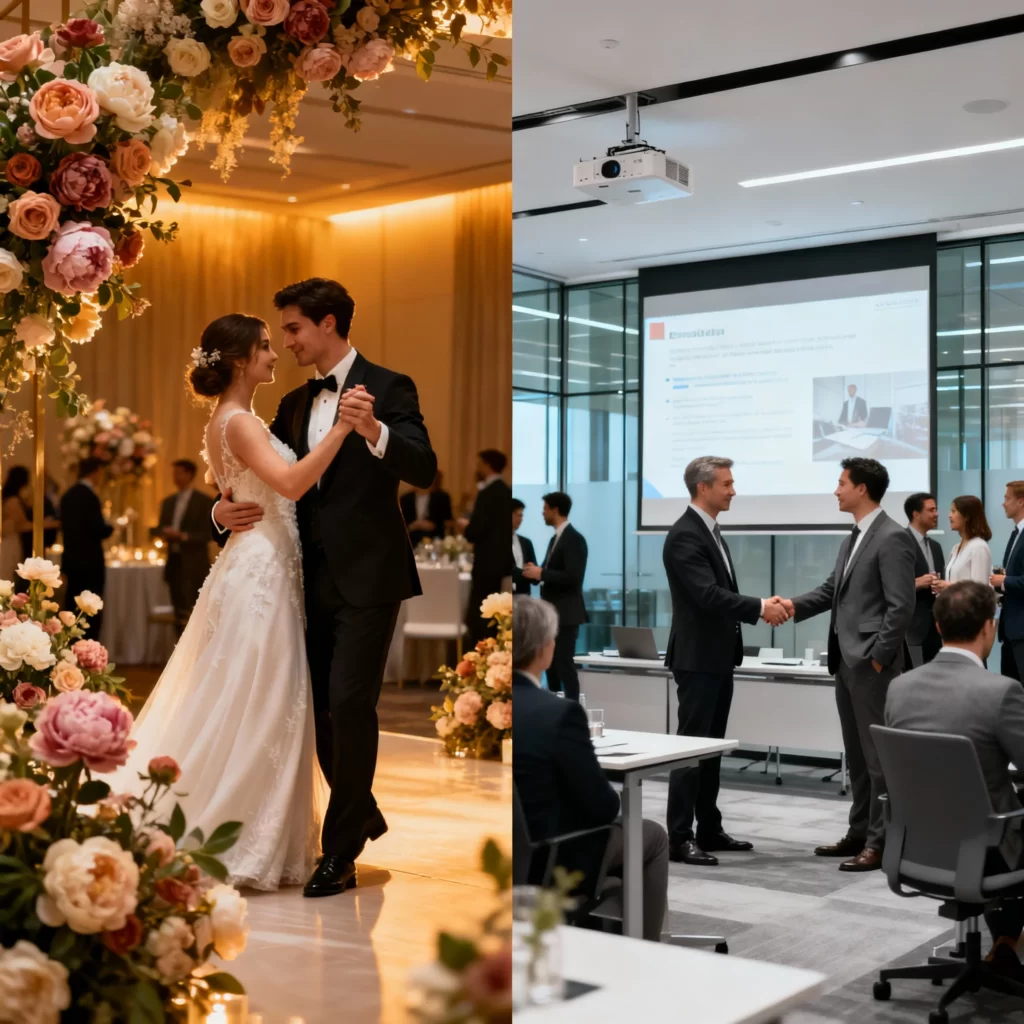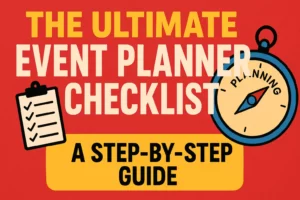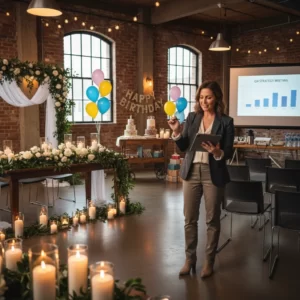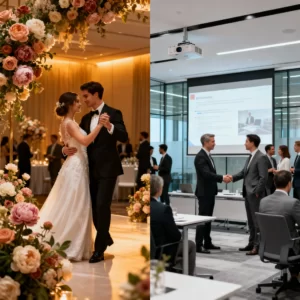Corporate vs. Wedding Event Planner: Key Differences & What You Need to Know
TL;DR: Event Focus: Wedding planners specialize in personal celebrations (ceremonies, receptions, engagement parties, bridal showers, rehearsal dinners, etc.), whereas corporate planners handle business events (conferences, product launches, trade shows, awards ceremonies, team-building events, corporate dinners).
- Goals & Metrics: Corporate events are driven by business goals and often measure success by ROI, brand awareness or networking outcomes. Weddings focus on a memorable personal experience and “dream day” for the couple.
- Responsibilities: Wedding planners manage every wedding detail – venue selection, vendor contracts, budgeting, design, and day-of coordination – including related sub-events like engagement parties and after-parties. Corporate planners coordinate logistics (venues, AV equipment, agendas), negotiate contracts, market the event, and often handle attendee registration and sponsor needs.
- Skills & Clientele: Wedding planning demands creativity, flexibility, and empathy (working closely with the couple and families). Corporate planning requires business savvy, strict organization, and the ability to work with executives and marketing teams.
- Career & Stress: Corporate event management often offers higher pay and clear career paths, but involves high-pressure environments. Wedding planning is emotionally rewarding and detail-oriented, with stress coming from client expectations and big personal investments.
Introduction
As more people plan events for the upcoming year, choosing the right type of event planner has become an important early decision.
Whether you’re saying “I do” or signing a business deal, an event planner can make all the difference. But not all event planners are the same. A wedding event planner and a corporate event planner may both handle logistics, but their day-to-day worlds are very different. One focuses on romance, personal details, and a seamless ceremony; the other focuses on brand goals, schedules, and professional audiences.
If you’re researching costs and packages, it also helps to understand how much event planners charge? before you book your ideal planner.
In this guide, we’ll break down the key differences between wedding and corporate event planners so you can decide which expertise fits your needs (or your career goals).
What Is a Wedding Event Planner?
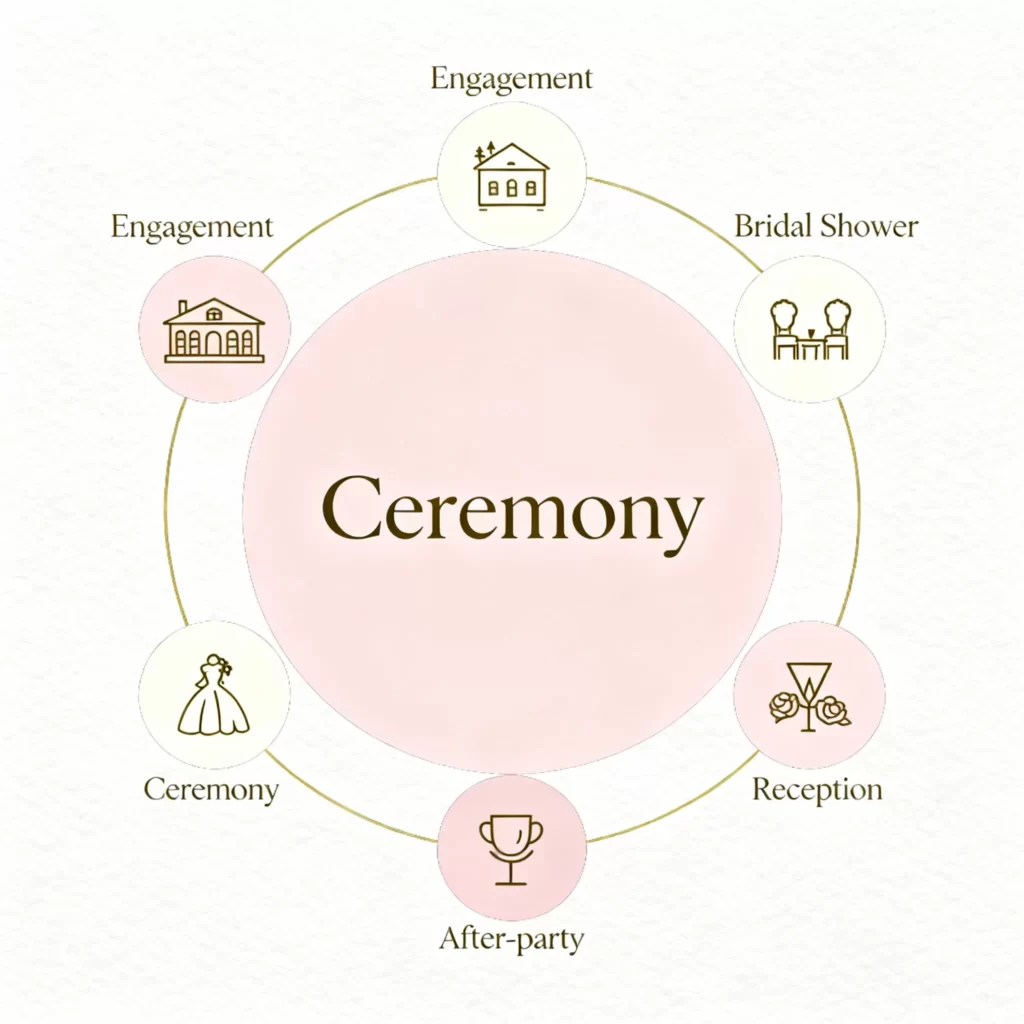
A wedding event planner specializes in creating dream weddings and related celebrations. From the first “Yes” to the last dance, these planners help couples manage every detail.
Planners like Little Black Book Event Services in Washington, D.C., are great examples of professionals who bring elegance and precision to every couple’s big day — from budgeting to décor.
According to Brides magazine, wedding planners “are all about the logistics, from vendor referrals and contract negotiations to the day-of execution of your vision”. In practice, this means a wedding planner’s responsibilities typically include:
- Venue and Vendor Management: Helping the couple choose and book venues, caterers, florists, photographers, and other vendors; negotiating contracts and tracking payments.
- Budgeting: Creating and managing the wedding budget so expenses stay on track.
- Timeline & Logistics: Developing a detailed timeline of wedding-day events (ceremony, reception, speeches, etc.) and coordinating all moving parts to keep the day running smoothly.
- Design & Décor: Guiding the couple on theme, color scheme, table settings, and overall design style. Wedding planners often have creative skills in décor and aesthetics.
- Rehearsal and Day-Of Coordination: Organizing the wedding rehearsal and then overseeing the ceremony and reception, making sure vendors and wedding parties are in place and on schedule.
- Family & Guest Communication: Sometimes mediating between families or helping manage expectations, especially during rehearsal dinners or any cultural/tradition-related issues.
Couples in D.C. often explore unique wedding venues Washington DC for modern or historic backdrops that fit their wedding aesthetic perfectly.
Wedding planners also handle related events beyond the ceremony and reception. To understand how both elements differ, read this detailed guide on wedding ceremony and reception.
Wedding planners also handle related events beyond the ceremony and reception. For example, pre-wedding events like the engagement party or bridal shower, and post-wedding gatherings like an after-party or next-day brunch. As one wedding industry blog explains, “Wedding planners learn all about various pre-wedding gatherings (engagement party, stag and doe, bridal shower, etc.) and even the afterparty”. In short, wedding planners are on hand from the very start of the “wedding journey” through the final farewells, ensuring a seamless experience for the couple and their families.
What Is a Corporate Event Planner?
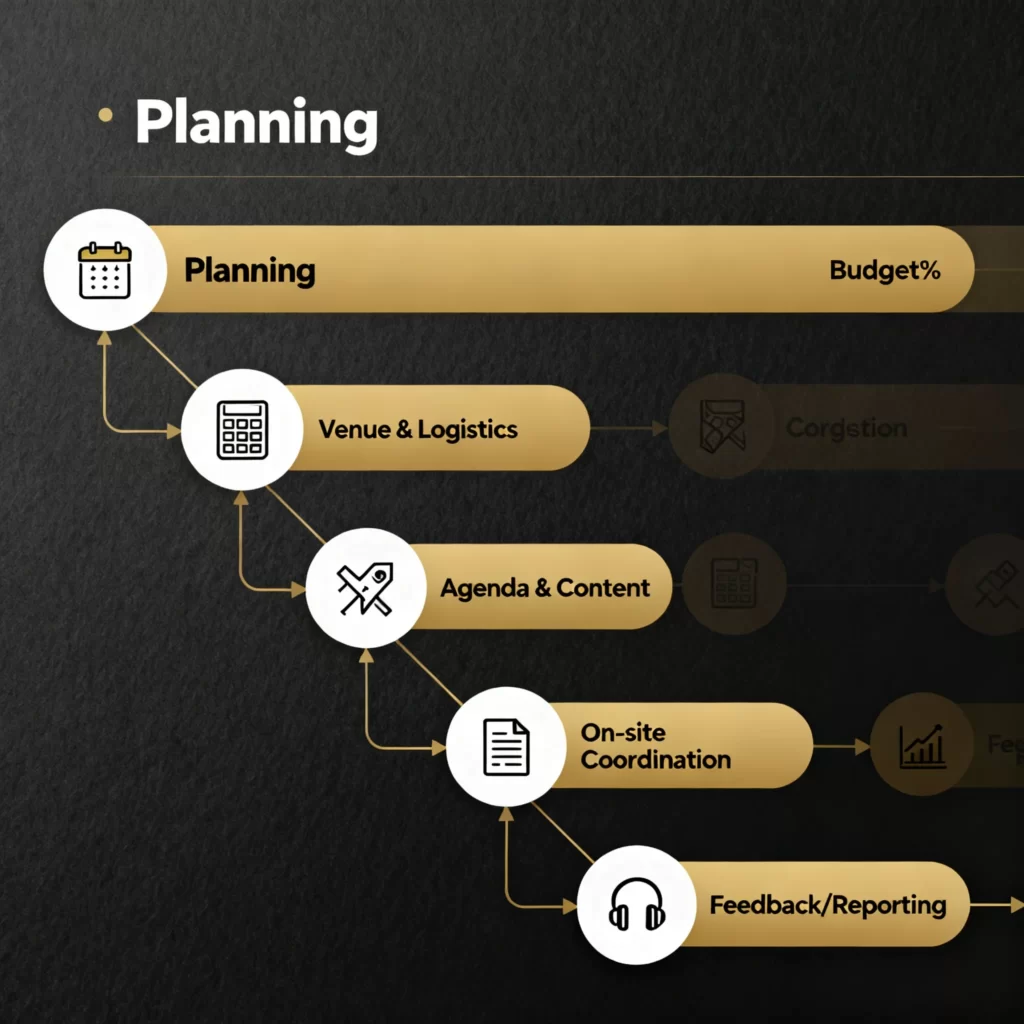
A corporate event planner (sometimes called a meeting planner or business event planner) focuses on professional gatherings for companies and organizations. These events can range from internal staff meetings and training sessions to large public conferences and product launches.
For entertainment-based corporate gatherings, companies sometimes partner with creative vendors like 21Fun – Casino Party to bring unique, themed energy to their events.
According to Multi Image Group (MIG), corporate event planners organize events “for businesses and organizations” and typically handle things like “product launches, conferences, trade shows, awards ceremonies, team building events, [and] business dinners”.
Key responsibilities of a corporate event planner often include:
- Client Coordination: Working with corporate clients (marketing teams, executives, PR departments) to define the event’s objectives and requirements.
- Venue & Logistics: Booking appropriate venues (conference centers, hotels, expo halls), arranging travel and accommodations for attendees, and overseeing on-site logistics. This includes setting up audio-visual equipment (projectors, microphones), seating, signage, and any technical needs.
- Agenda & Content: Developing a conference or meeting agenda, scheduling speakers or breakout sessions, and planning the flow of the day. In a trade show or expo, this could involve arranging exhibitor booths or sponsor activation areas.
- Vendor & Sponsor Management: Negotiating contracts with caterers, decorators, AV teams, and other vendors, and coordinating with sponsors or exhibitors to meet branding and promotional needs.
- Budget & Marketing: Managing a budget often tied to marketing or training goals. Some corporate planners also handle marketing the event (email campaigns, registration) to potential attendees.
- On-site Coordination: Overseeing the event in real time to troubleshoot issues, manage the event staff, and ensure everything runs on schedule. After the event, they may also gather feedback or performance metrics.
Corporate planners often scout well-equipped event venues Washington DC for meetings and conferences — spaces that balance functionality and sophistication.
Indeed.com highlights that a corporate event planner’s tasks can include “discussing requirements with clients, booking venues (hotel rooms or conference centers), marketing the event to attendees, negotiating vendor contracts, arranging decorations, setting up equipment (projectors, microphones), planning the event agenda, hiring caterers, creating and sticking to a budget, coordinating staff, and monitoring the event”. In short, corporate planners ensure that a company’s business event not only happens smoothly, but also achieves its strategic goals (such as generating leads at a trade show or celebrating company achievements at an awards gala).
Key Differences Between Wedding and Corporate Event Planners
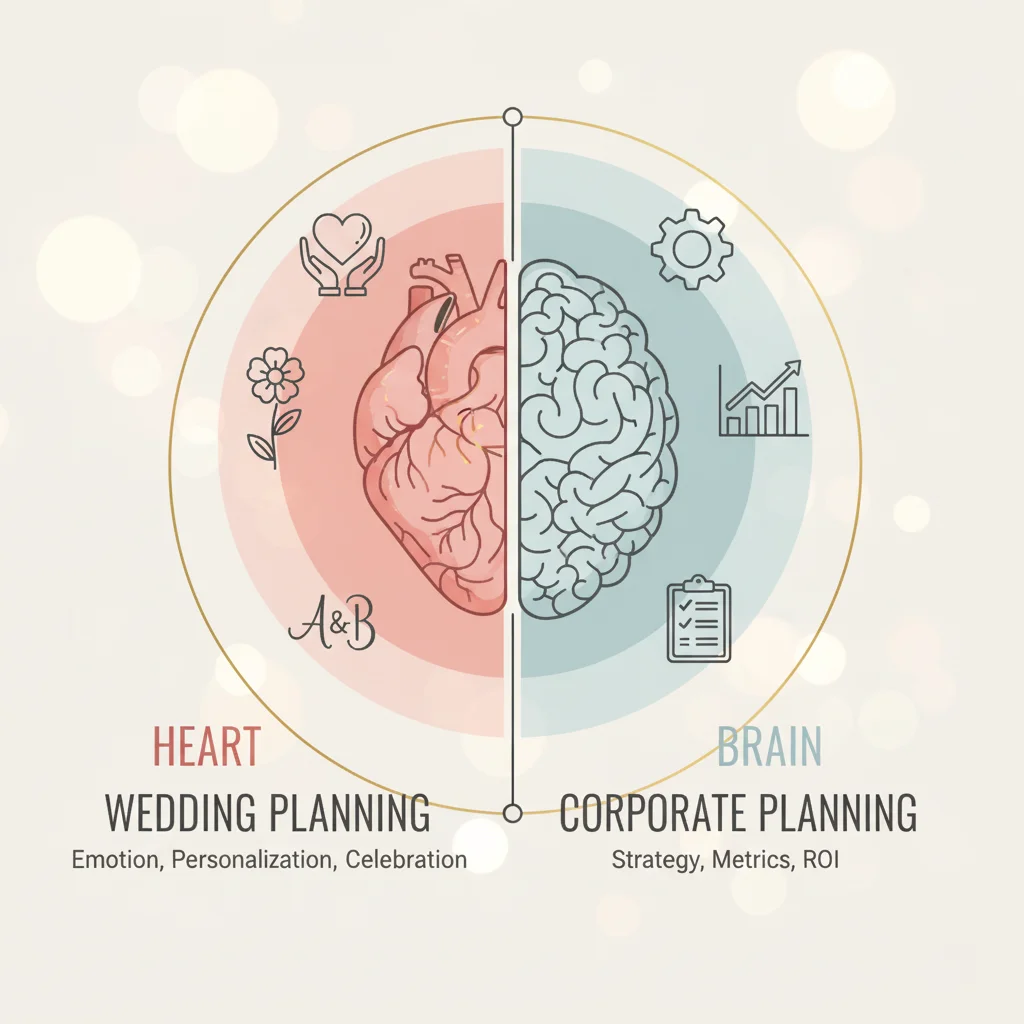
While there is overlap (both roles require organization and communication skills), the focus and day-to-day work of wedding planners and corporate planners differ in important ways.
Here are some of the main contrasts:
- Types of Events: Wedding planners exclusively handle personal celebrations, including all facets of a wedding (from engagement to reception). They may also plan related parties (bridal showers, rehearsal dinners, bridal brunches). Corporate planners handle professional events – think conferences, seminars, product launches, trade shows, corporate retreats, holiday parties, and award ceremonies.
- Goals & Motivations: A wedding is driven by the couple’s vision and emotions. The goal is a memorable, romantic experience for the newlyweds and their guests. Corporate events, on the other hand, are driven by business objectives – such as training employees, launching a product, or strengthening client relationships. Success may be measured in terms of brand exposure or business outcomes, not just smiles.
- Planning & Scope: Wedding planning often follows a “wedding day” timeline, with many detailed tasks (choosing floral centerpieces, cake tastings, etc.). Wedding planners may spend months on one event and handle a broad scope of personal details. Corporate planners might manage multiple events per year (some recurring), each potentially involving complex schedules (keynote, panels, breakouts, networking lunches, etc.) but with less emphasis on aesthetic personalization.
- Sub-Events & Extras: Beyond the main ceremony and reception, weddings have numerous sub-events: engagement parties, bridal showers, bachelor/bachelorette parties, rehearsal dinners, after-parties, and next-day brunches. Wedding planners often coordinate these as well. Corporate events also have sub-components – for example, a conference might include keynote speeches, breakout workshops, networking mixers, product demos, or training sessions – but these are all generally tied to the conference’s business agenda.
- Client & Stakeholder Dynamics: Wedding planners typically work closely with one main client (the engaged couple) and their families. The decision-making center is personal (what the bride and groom want). Corporate planners work with companies’ stakeholders (marketing managers, executives, PR teams), and may need to answer to multiple decision-makers. They must align with brand guidelines and corporate goals. A blog on event planning notes that “corporate clients have clear ideas about their events” and expect planners to uncover and execute those ideas, often with formal goals and benchmarks.
- Skills & Approach: Wedding planning demands creativity and empathy. Planners design custom themes and decorations, and often act as a confidant to clients under stress. They need to be highly organized but also flexible (family dynamics and unexpected hiccups on the wedding day). Corporate planners need strong project management and business skills – they must be detail-oriented about logistics, budget-conscious, and adept at coordinating large teams and technical setups. They usually work in a business-like manner, dealing with executives and often using data to measure success.
- Budgeting: Both planners manage budgets, but corporate events often have larger, department-controlled budgets tied to marketing or training, and planners must justify spending. ROI (return on investment) is important – for example, by tracking attendee registrations or post-event leads. Wedding budgets come from individuals/families and focus on guest experience. The success of a wedding isn’t measured in profit but in customer (couple) satisfaction.
- Pace & Environment: Wedding planning has emotional highs and personal stakes (it’s a “once-in-a-lifetime day” for the couple). Even small mistakes can be life-changing for the bride and groom. Corporate planning can be high-pressure too, with tight deadlines and large audiences, but it’s often recurring (annual conferences, etc.). According to an industry FAQ, wedding planning is more “emotionally charged” while corporate event planning is “fast-paced and high-pressure”.
In summary, wedding planners are dream-weavers for couples, focusing on personalization and family memories. Corporate planners are business strategists, focusing on organization, branding, and measurable outcomes. Both must be excellent organizers, but the context, objectives, and skillsets are quite different.
| Feature/Aspect | Wedding Planner | Corporate Planner |
|---|---|---|
| Event Type | Personal celebrations: weddings, bridal showers, engagement parties | Professional gatherings: conferences, product launches, trade shows |
| Goals & Metrics | Memorable experience for couple and guests | Business outcomes: ROI, brand awareness, networking |
| Responsibilities | Venue & vendor management, décor, timeline, family coordination | Venue & logistics, agenda planning, vendor & sponsor management |
| Skills | Creativity, flexibility, empathy | Organization, business acumen, project management |
| Pace & Environment | Emotionally charged, detail-oriented | Fast-paced, business-focused |
| Budgeting | Personal/family budgets | Department-controlled, ROI-focused |
Skills and Career Paths
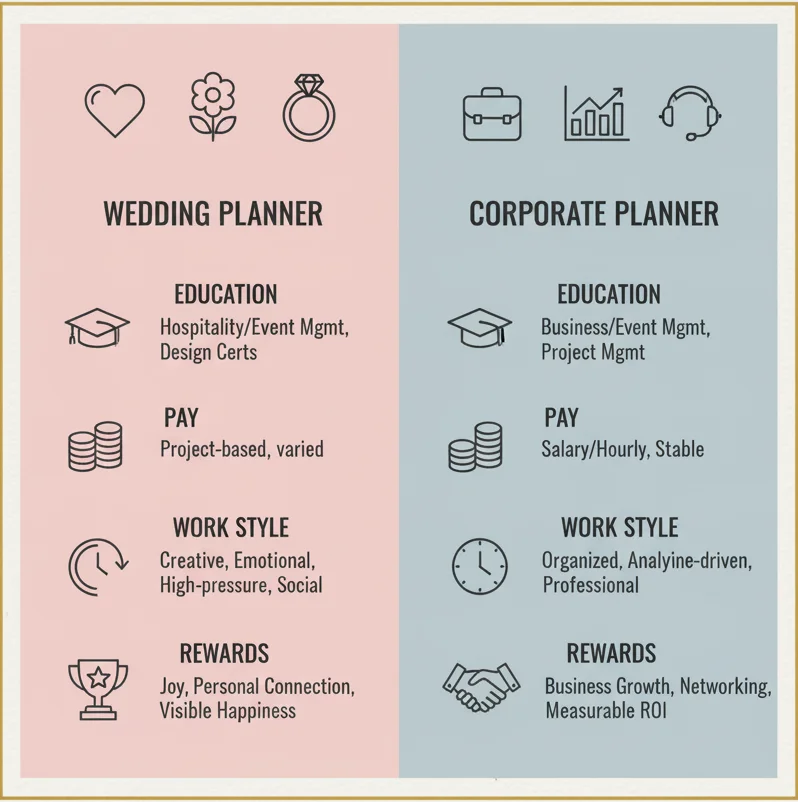
Since event planning is a popular career choice, you might wonder if you should specialize in weddings or corporate events (or both).
For inspiration, look at some of the best wedding venues in San Antonio that top wedding planners regularly recommend — these show the level of creativity and client connection expected in personal event planning.
Here are some career-related differences:
- Education and Background: Many corporate event planners have formal education in business, marketing, or hospitality, because they work closely with business teams. Wedding planners often come from hospitality, design, or have hands-on experience in weddings. Certification courses exist for both (e.g., “Corporate Event Planning” vs “Wedding and Event Planning” courses).
- Advancement and Pay: Corporate event management typically offers higher salaries and advancement in larger companies or agencies. Splento reports that corporate planners often find more high-paying positions and growth opportunities. Wedding planners can earn well, especially in luxury markets, but the income may vary widely depending on your clientele and region.
- Work Style: Corporate planners often work in teams (or for a company) and follow set procedures. Wedding planners might be freelancers running their own small businesses, providing highly personalized service. Some event professionals switch between both fields; gaining experience in one can make it easier to understand the other, but each has its own industry “network” and seasonal cycles.
- Rewards: Wedding planning can be immensely rewarding on a personal level – helping someone create a heartfelt celebration. Corporate planning can be rewarding in a different way (e.g., pulling off a successful conference with hundreds of attendees or a product launch on schedule).
Ultimately, the best fit depends on your passions and strengths. As Splento’s event FAQ points out, if you’re creative and passionate about weddings, wedding planning might suit you. If you enjoy business and fast-paced projects with teams, corporate event management may be a better match.
Wedding planners who operate in busy metro regions, like D.C., frequently handle elaborate receptions such as a Washington wedding reception with luxury décor and cultural elements.
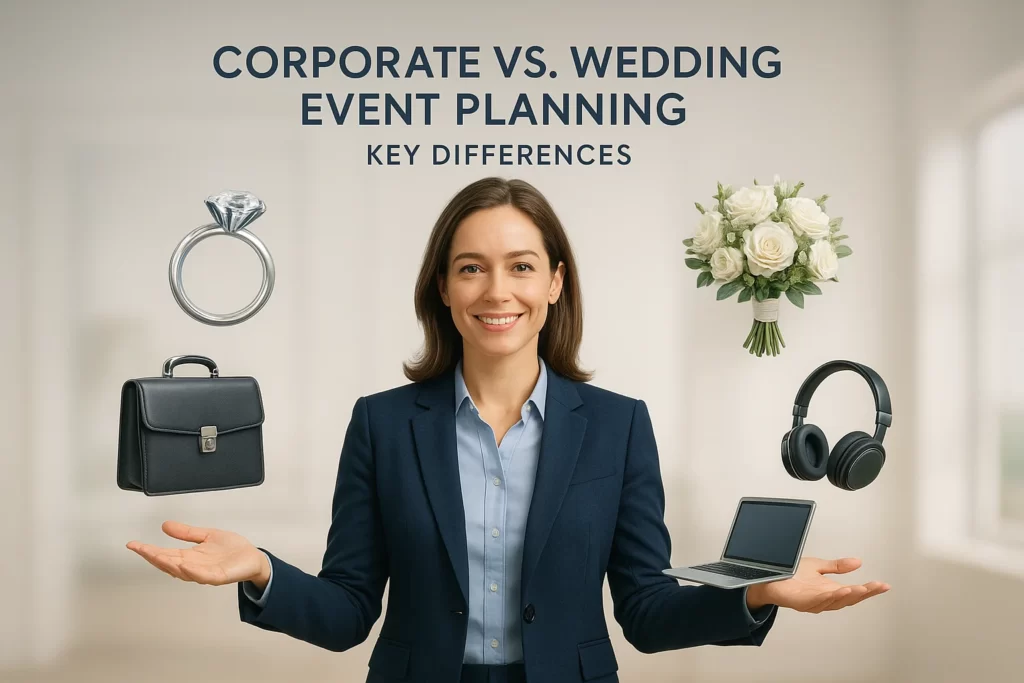
Conclusion
Though both roles involve coordinating events, a wedding event planner and a corporate event planner are experts in very different worlds. A wedding planner focuses on personal, one-of-a-kind celebrations – handling every detail from the engagement party to the first dance – with creativity and heart. A corporate planner focuses on professional gatherings – organizing logistics, vendors, and agendas to meet business goals. Understanding these differences helps you choose the right planner (or career path) for your needs. No matter the type, great event planners share excellent organizational skills and the ability to keep events running smoothly. But remember: weddings are about “I do” and happily-ever-after, while corporate events are about strategy, branding, and teamwork. Knowing the distinction will help you hire or become the right kind of planner for your next big event.
If you’re planning a personal or professional gathering in D.C., explore local event venues Washington DC to match your vision perfectly.
Sources:
- Exploring The 4 Types Of Event Planners
- The Difference Between Wedding Planners, Coordinators, and Designers—And How to Know Which Ones You Should Hire
- How To Become a Corporate Event Planner
- Event industry FAQs: Which one is better, corporate event management or wedding event management?
- Corporate Event Planning Course vs. Wedding Planning Course: What’s the Difference?
Frequently Asked Questions
What does a wedding event planner do?▾
A wedding planner handles all aspects of wedding planning: selecting venues, coordinating vendors (caterers, florists, photographers, etc.), managing the budget, designing décor and themes, and creating the day-of timeline. They also often organize related celebrations like the engagement party, rehearsal dinner, or bridal shower.
What does a corporate event planner do?▾
Corporate planners organize business events and meetings. Their duties include meeting with company clients to set goals, booking conference facilities, arranging speakers and equipment (like projectors), planning agendas, marketing the event to attendees, negotiating with vendors, managing the budget, and coordinating on-site logistics.
Can an event planner do both weddings and corporate events?▾
Some planners offer both services, but many specialize. Wedding and corporate events have different needs: one is highly personal and creative, the other is driven by business objectives. Planners with versatile skills might serve both, but they should be aware of the distinct demands (e.g., emotional vs. formal environments).
Which pays more: wedding or corporate event planning?▾
Generally, corporate event planners have higher average salaries and more corporate job opportunities. Corporate events often have bigger budgets and full-time roles. Wedding planners’ income can vary based on experience, location, and client budget. Both fields can be lucrative, but corporate planning tends to offer more stable, high-paying positions.
Which is more stressful: wedding or corporate event planning?▾
Both can be stressful in different ways. Wedding planning is emotionally intense – couples pour their savings and hopes into a wedding, so expectations are high. Corporate events are often high-pressure with tight deadlines and large professional audiences. Weddings can be more emotionally charged, while corporate events are fast-paced and pressure-filled.
How do the skills differ for each planner?▾
Wedding planners need creativity, attention to personal detail, and strong interpersonal skills to handle clients’ emotions. Corporate planners need strong project management, negotiation, and sometimes marketing skills, as well as the ability to work within corporate structures and measure event ROI.
Related Post
Contact Us
Please provide your contact information with event details. You will be contacted soon.

